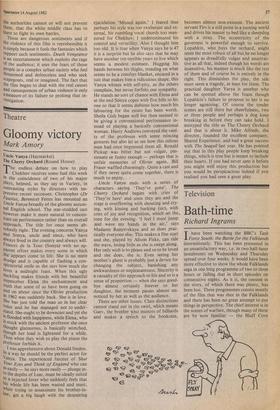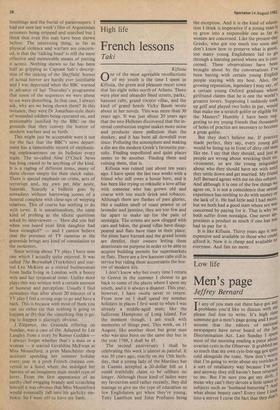Television
Bath-time '
Richard Ingrams
have been watching the BBC's Task
I
Force South: the Battle for the Falklands intermittently. This has been presented in an unsatisfactory way, i.e. in two half-hour instalments on Wednesday and Thursday spread over four weeks. It would have been more effective to show the whole Falklands saga in one long programme of two to three hours or failing that in short episodes on consecutive nights. As it is, the tension in the story, of which there was plenty, has been lost. These programmes consist mostly of the film that was shot in the Falklands and there has been no great attempt to put things in perspective. The chief interest is in the scenes of warfare, though many of these are by now familiar — the Bluff Cove
bombings and the burial of paratroopers. I had not seen last week's film of Argentinian prisoners being stripped and searched but 1 think that even this may have been shown before. The interesting thing, as far as physical violence and warfare are concern- ed, is that the 'talking head' is still the most effective and memorable means of putting it across. Nothing shown so far has been half as gripping as Captain Salt's descrip- tion of the sinking of the Sheffield. Scenes of actual horror are hardly ever justifiable and I was depressed when the BBC warned in advance of last Thursday's programme that some of the sequences we were about to see were disturbing. In that case, I always ask, why are we being shown them? In this instance, they were Dr Jonathan-style shots of wounded soldiers being operated on, and presumably justified by the BBC on the grounds that they convey the horror of modern warfare and so forth.
This might just be acceptable were it not for the fact that the BBC's news depart- ment has a lamentable record of emphasis- ing unpleasantness on its bulletins every night. The so-called Nine O'Clock News has long ceased to be anything of the kind. It is a ragbag of different items, many of them chosen simply for their shock value. There is special emphasis on crime, acts of terrorism and, my own pet bete noire, funerals. Scarcely a bulletin goes by nowadays without harrowing scenes of a funeral complete with close-ups of weeping relatives. This of course has nothing to do with news. It is sensationalism, the same kind of probing as the idiotic questions asked by interviewers — 'How did you feel when you heard your little daughter had been strangled?' — and 1 cannot believe that the presence of TV cameras at the graveside brings any kind of consolation to the mourners.
Since writing about TV plays I have seen one which I actually quite enjoyed. It was called The Boxwallah (Yorkshire) and star- red Leo McKern as a retired businessman from India living in London with a boozy wife and her tyrannical sister. Unlike most plays this was written with a certain amount of humour and perception. Usually I find nowadays that after about 20 minutes of a TV play I feel a strong urge to go and have a bath. This is because with most of them you can see either (a) that nothing is going to happen or (b) that the something that is go- ing to happen is glaringly obvious.
L 'Elegance, the Granada offering on Sunday, was a case of (b). Adapted by Lee Langley from a story by Rumer Godden I always forget whether that's a man or a woman — it starred Geraldine McEwan as Miss Mountford, a prim Manchester shop assistant spending her summer holiday every year in a posh French chateau con- verted to a hotel where she indulged her fantasy of an imaginery male model type of lover. From the first appearance of an earthy chef swigging brandy and scratching himself it was obvious that Miss Mountford would eventually fall into his garlicky em- brace. So I went off to have my bath.



































 Previous page
Previous page